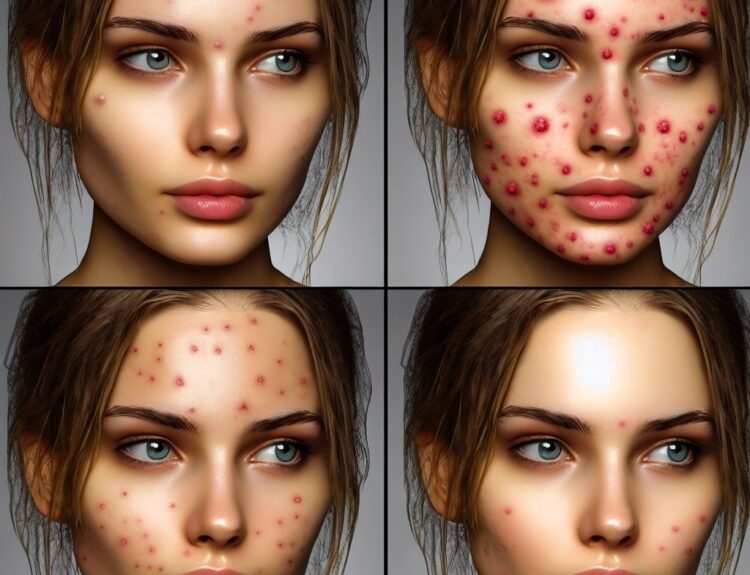Acne is a common skin condition that affects millions of people worldwide. While Western medicine has made significant advancements in treating acne with drug formulations and targeted medicines, it has largely overlooked the role of lifestyle and nutrition in managing this condition. However, recent empirical research has revealed a strong connection between what we eat and the occurrence of acne. In this article, we will explore the impact of dietary changes on acne and how adopting a healthier lifestyle can be the best long-term solution for treating and preventing acne.
Understanding the Link Between Diet and Acne
For years, the medical community struggled to establish a clear link between nutrition and acne. However, in the last 15 years, a growing body of research has shown that consuming refined carbohydrates and sugar can be the root cause of many acne-related disorders. When these foods are digested, they trigger the production of insulin and insulin-like growth factors, such as IGF-1. These hormones, in turn, stimulate the production of male hormones, leading to an increase in sebum production.
Sebum is the oil secreted by the skin’s sebaceous glands, and an excess of sebum can clog pores, leading to the development of acne. Furthermore, the accumulation of sebum creates an ideal environment for bacteria to thrive, resulting in inflammation and the formation of acne lesions.

The Impact of Refined Carbohydrates and Sugar
Refined carbohydrates and sugar, found in foods like pasta, bread, and sugary snacks, cause a rapid spike in blood sugar levels. This spike triggers the release of insulin and IGF-1, which stimulate sebum production. The excess sebum then clogs the pores and provides a breeding ground for bacteria, leading to the development of acne.
To combat this, it is recommended to reduce the intake of processed carbohydrates and sugar in your diet. By doing so, you can effectively reduce the production of sebum and minimize the risk of pore blockage.
The Power of a Healthy Diet
While cutting back on processed carbohydrates and sugar is a crucial step in managing acne, it is equally important to focus on consuming a healthy diet that promotes clear skin. Certain foods have been found to actively improve skin health and reduce acne.
1. Raw Vegetables for Clearer Skin
Raw vegetables are rich in antioxidants and nutrients that help cleanse the body from within. Antioxidants act as scavengers, eliminating free radicals and toxins that can contribute to acne. By consuming a variety of raw vegetables like spinach, kale, and broccoli, you can boost your body’s ability to eliminate harmful substances and improve your skin’s overall health.
2. Foods Rich in Omega-3 Fatty Acids
Omega-3 fatty acids have anti-inflammatory properties and can help reduce the severity of acne lesions. Incorporating foods rich in omega-3 fatty acids, such as fatty fish (salmon, mackerel), walnuts, and chia seeds, into your diet can help decrease inflammation and promote clearer skin.
3. Probiotic-Rich Foods for a Healthy Gut
Maintaining a healthy gut microbiome is essential for overall well-being, including skin health. Probiotic-rich foods like yogurt, kefir, and sauerkraut contain beneficial bacteria that support a healthy gut. By improving your gut health, you can enhance your body’s ability to detoxify and reduce the occurrence of acne.
4. Zinc-Rich Foods for Skin Healing

Zinc is an essential mineral that plays a crucial role in wound healing and reducing inflammation. Incorporating zinc-rich foods such as oysters, pumpkin seeds, and lean meats into your diet can support skin healing and reduce the duration of acne breakouts.
Lifestyle Changes for Clearer Skin
In addition to dietary modifications, certain lifestyle changes can further contribute to clearer skin and reduce the occurrence of acne.
1. Regular Exercise for Improved Blood Circulation
Engaging in regular exercise not only benefits your overall health but also improves blood circulation. Increased blood flow delivers oxygen and nutrients to the skin, promoting a healthy complexion and facilitating the healing of acne lesions. Aim for at least 30 minutes of moderate-intensity exercise, such as brisk walking or cycling, on most days of the week.
2. Stress Management for Hormonal Balance
Stress can trigger hormonal imbalances that contribute to acne flare-ups. Implementing stress management techniques like meditation, yoga, or deep breathing exercises can help regulate your body’s stress response and maintain hormonal balance.
3. Sufficient Sleep for Skin Regeneration
Adequate sleep is essential for the body’s natural healing and regeneration processes. During sleep, the body repairs damaged cells, including those affected by acne. Aim for 7-9 hours of quality sleep each night to optimize skin health and reduce the occurrence of acne breakouts.
4. Proper Skincare Routine
Maintaining a consistent and effective skincare routine can help manage acne and prevent future breakouts. Use gentle cleansers and non-comedogenic moisturizers to keep your skin clean and hydrated. Avoid harsh scrubs or abrasive treatments that can irritate the skin and exacerbate acne.

Conclusion
While Western medicine has traditionally focused on drug-based treatments for acne, the role of lifestyle and nutrition in managing this condition should not be underestimated. Adopting a healthier lifestyle that includes a balanced diet, regular exercise, stress management, sufficient sleep, and a proper skincare routine can significantly improve acne symptoms and prevent future breakouts. By addressing the underlying causes of acne through lifestyle changes, you can achieve clearer, healthier skin in the long run.
Remember, each person’s skin is unique, and it may take time to find the right combination of dietary and lifestyle modifications that work for you. Consult with a dermatologist or healthcare professional to develop a personalized plan that suits your specific needs and goals.







